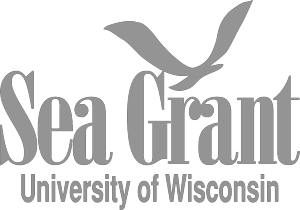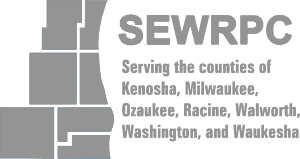
Meeting summary for the March 2022 CALM Network held virtually on March 23, 2022.
March 2022 CALM Kick-Off Meeting Summary
The kick-off meeting for the Collaborative Action for Lake Michigan (CALM) Coastal Resilience network was held virtually on March 23, 2022. CALM is a network for communities along Wisconsin’s entire Lake Michigan coastline working to sustain, strengthen, and connect existing regional coastal resilience networks to expand collaboration across the coast. Through regular meetings and workshops, CALM will increase collaboration, support development of local policies and plans, and coordinate the regional prioritization of hazard needs.
This was the first meeting of the CALM network focused on establishing the collaborative network and demonstrating what opportunities CALM will provide to Lake Michigan’s coastal stakeholders throughout the next year.
The event was attended by 87 stakeholders from state and federal agencies, local municipalities, academic institutions, consulting and engineering firms, sewerage districts, non-profit organizations, elected official’s offices, regional planning commissions, as well as other organizations and partnerships working on coastal resilience in Wisconsin.
A recording of this meeting is available below along with a summary of the meeting’s speakers and topics.
If you do not already receive the monthly Coastal Resilience Newsletter, you can sign up online. The newsletter highlights new or relevant tools and resources, case studies, events, funding sources, and opportunities to collaborate with others in the CALM network.
Additionally, continue to check the Wisconsin Coastal Resilience website to find tools and resources, water level updates, funding opportunities, case studies, profiles of agencies and organizations working on coastal resilience in Wisconsin, and more! We will regularly develop and add content to the website.
Recording
PDF Version of Presenters’ Slides
Summary
Beyond establishing the goals for CALM, the meeting featured presentations discussing coastal data needs, resources, infrastructure funding, upcoming trainings, and more. Speakers and topics included:
Introducing CALM
Lydia Salus, Wisconsin Coastal Management Program
Website: https://wicoastalresilience.org/
Lydia introduced the CALM project framework, scope, and goals; shared the results of a coastal resilience needs and priorities survey; and provided an overview of the outreach and communication modes that will be used to share tools, resources, and collaborative opportunities with this network.
Great Lakes & St. Lawrence Initiative Coastal Resilience Programming
Tori Graves, Great Lakes and St. Lawrence Cities Initiative
Wisconsin Coastal Support Factsheet
Cities Initiative staff shared an overview of their coastal resilience programming pertaining to Wisconsin communities including the Regional Coastal Resilience Work Groups funded by the Fund for Lake Michigan and the Lake Michigan Coastal Resilience Initiative in partnership with NOAA.
Wisconsin Coastal-Management Data Infrastructure (WICDI)
Jim Giglierano, Wisconsin Department of Administration
Website: https://wicdi.org/
Jim discussed how an ongoing NOAA Project of Special Merit called the Wisconsin Coastal Management Data Infrastructure Project (WICDI) can help incorporate existing sources of GIS and build or modify data for your coastal resiliency projects in several ways: 1) help find existing, planned or in-progress data, 2) help connect you to data experts or projects doing similar work locally, or elsewhere in the state or US, 3) assist directly with creating hydro data, including culvert inventories and hydro-enforced DEMs needed for watershed modeling.
Wisconsin Coastal Atlas
Lydia Salus, Wisconsin Coastal Management Program
Website: https://www.wicoastalatlas.net/
Lydia described the components of an online resource hub called the Wisconsin Coastal Atlas and the types of resources it provides.
Wisconsin Initiative on Climate Change Impacts 2021 Assessment Report
Adam Bechle, Wisconsin Sea Grant
2021 Report: https://wicci.wisc.edu/2021-assessment-report/
Adam discussed the newly released Wisconsin Initiative on Climate Change Impact (WICCI) 2021 Assessment Report which includes science-based strategies to address climate change. He highlighted the new climate modeling data and coastal resilience topic area.
Infrastructure Investment and Jobs Act
Rachel Keylon, Coastal States Organization
IIJA Coastal Appropriations Overview
Rachel provided an overview of the Infrastructure Investment and Jobs Act and discussed the relevant coastal appropriations.
Stormwater Infrastructure Funding and Financing Workshops
Shanyn Viars, American Rivers
Resource Website: https://www.americanrivers.org/stormwatercurrency/index.html
Shanyn joined us to talk about their upcoming workshops about stormwater infrastructure funding and financing approaches.
Floodplain Management Training
Frank Shockey, Federal Emergency Management Agency
WI DNR Floodplain Management Webpage: https://dnr.wisconsin.gov/topic/FloodPlains
Considering the new and upcoming releases of updated Flood Insurance Studies (FIS) and Flood Insurance Rate Maps (FIRMs) for Wisconsin’s coastal counties, FEMA and the Wisconsin DNR will be hosting floodplain management trainings in coastal areas to give local officials in counties that are entering their mapping regulatory process a chance to learn about their future responsibilities.
Discussion
One component of the meeting not captured in the recording was a breakout session where groups of three met in virtual breakout rooms for three minutes to meet other network members and discuss a key topic for this meeting. The results of a planning survey, that was sent to potential stakeholders in December 2021, were shared with the network during the meeting. Opportunities for collaborative projects was a top priority identified in the CALM Planning Survey for the question, “What would you like to hear about from your fellow network members?” In the breakout session, attendees discussed what “collaboration” meant to them in the context of their coastal resilience work on Lake Michigan.
The following list summarizes, and paraphrases the responses given by attendees after the breakout session:
• Different organizations coming together
• Sharing information
• Networking
• Planning and implementing projects at a watershed scale
• Leveraging each other’s expertise and experience
• Multidisciplinary
• Learning about what others are doing
• Aligning our efforts
• Joint grant applications
• Sharing resources
• Sharing project successes and failures
• Working towards a common goal
• Prioritizing issues and projects
• Participation for members of networks, projects, or groups
• Working with neighboring communities
• Respecting the projects and efforts others are working on
The next CALM network meeting is expected to be held in June 2022.
For questions or comments about CALM, please contact Lydia Salus, Project Coordinator.
(608) 266-3687 | lydia.salus@wisconsin.gov




